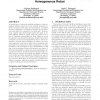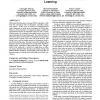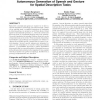ICMI
2009
Springer
14 years 9 months ago
2009
Springer
One of many skills required to engage properly in a conversation is to know the appropiate use of the rules of engagement. In order to engage properly in a conversation, a virtual...
GECCO
2009
Springer
14 years 9 months ago
2009
Springer
A central tenet of embodied artificial intelligence is that intelligent behavior arises out of the coupled dynamics between an agent’s body, brain and environment. It follows t...
ATAL
2009
Springer
14 years 9 months ago
2009
Springer
Computational modeling of human belief maintenance and decision-making processes has become increasingly important for a wide range of applications. We present a framework for mod...
ATAL
2009
Springer
14 years 9 months ago
2009
Springer
We present a software system for evaluating ‘dynamic’ protocol specifications for open multi-agent systems, that is, specifications that are developed at design-time but may...
ATAL
2009
Springer
14 years 9 months ago
2009
Springer
Multi-Agent Reinforcement Learning (MARL) algorithms suffer from slow convergence and even divergence, especially in largescale systems. In this work, we develop an organization-b...
ATAL
2009
Springer
14 years 9 months ago
2009
Springer
Previous work in multiagent coordination has addressed the challenge of planning in domains where agents must optimize a global goal, while satisfying local resource constraints. ...
ATAL
2009
Springer
14 years 9 months ago
2009
Springer
Current trends in model construction in the field of agentbased computational economics base behavior of agents on either game theoretic procedures (e.g. belief learning, fictit...
ATAL
2009
Springer
14 years 9 months ago
2009
Springer
Embodied conversational agents are required to be able to express themselves convincingly and autonomously. Based on an empirial study on spatial descriptions of landmarks in dire...
ATAL
2009
Springer
14 years 9 months ago
2009
Springer
We introduce an adversarial planning algorithm based on game tree search, which is applicable in large-scale multiplayer domains. In order to tackle the scalability issues of game...
ALDT
2009
Springer
14 years 9 months ago
2009
Springer
Aggregating preferences for finding a consensus between several agents is an important issue in many fields, like economics, decision theory and artificial intelligence. In this...








